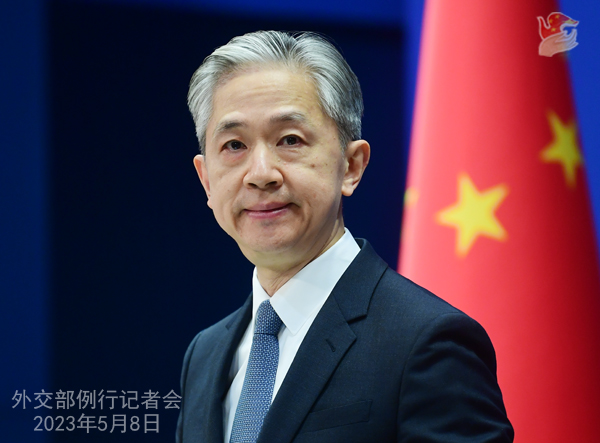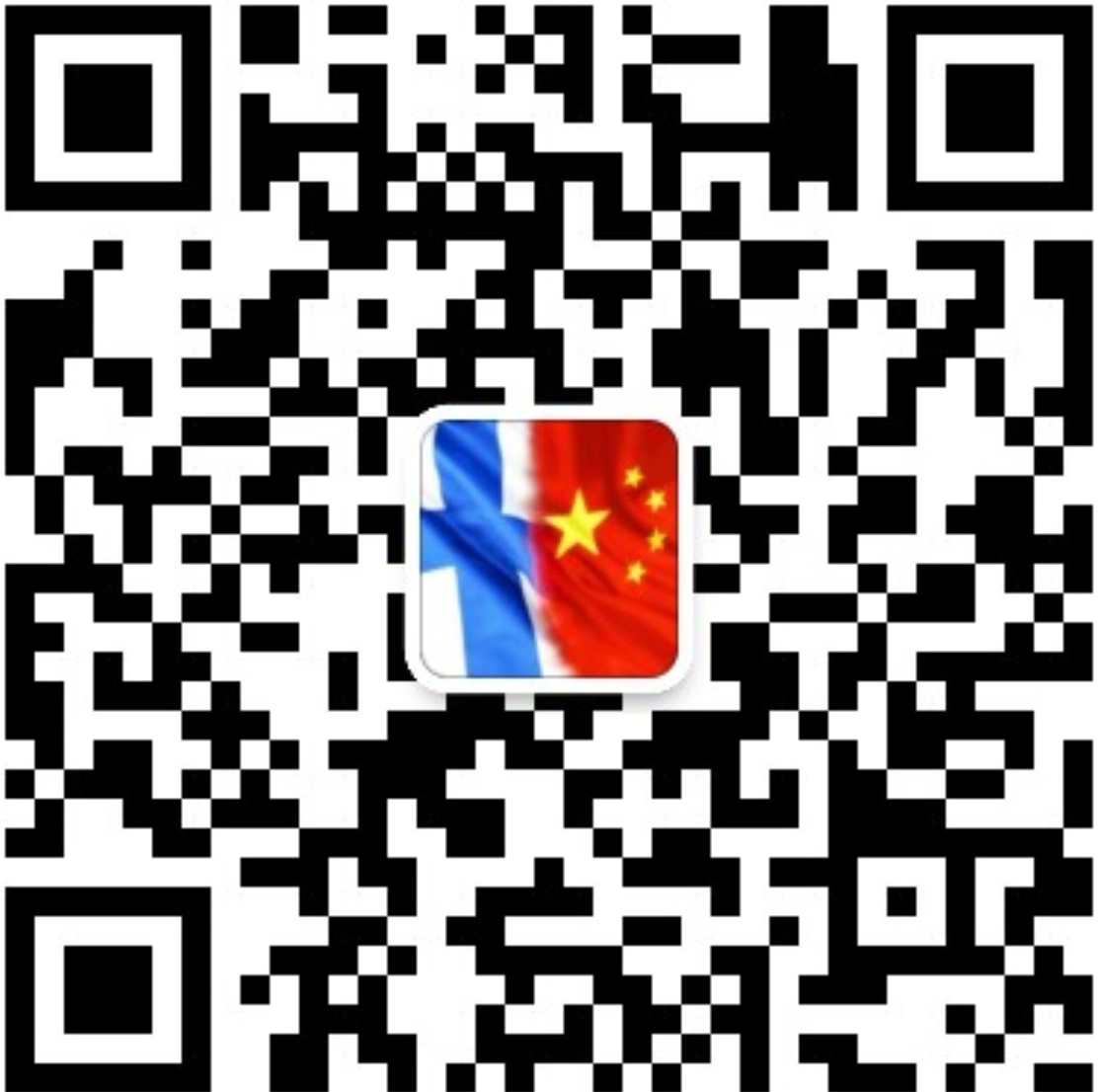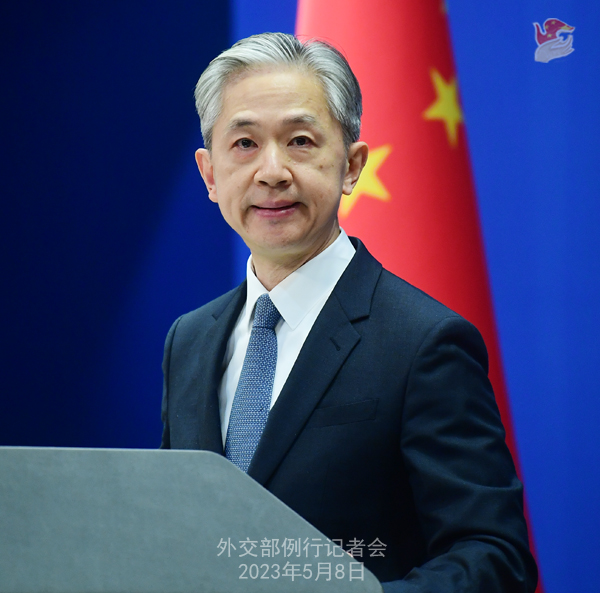
At the invitation of German Foreign Minister Annalena Baerbock, French Foreign Minister Catherine Colonna and Norwegian Foreign Minister Anniken Huitfeldt, State Councilor and Foreign Minister Qin Gang will pay a visit to Germany, France and Norway from May 8 to 12.
CCTV: How does China view its current relations with France? Could you share more with us on State Councilor and Foreign Minister Qin Gang’s upcoming visit to France? What does China hope to achieve through the visit?
Wang Wenbin: China and France are both permanent members of the UN Security Council and independent major countries. President Emmanuel Macron paid a successful state visit to China last month. With the guidance of President Xi Jinping and President Macron, China-France relations have sustained sound momentum of growth. The two countries are engaged in productive strategic communication, fruitful practical cooperation and sound communication and coordination in international and regional affairs.
During the visit, State Councilor Qin Gang will have in-depth exchange of views with France on efforts to follow through on the common understandings between the two heads of state, boost bilateral exchanges and cooperation in various fields and scale new heights in the China-France comprehensive strategic partnership. State Councilor Qin Gang will hold consultations with French Foreign Minister Catherine Colonna as the co-chairs of the China-France high-level dialogue on people-to-people exchange and compare notes on cultural and people-to-people exchanges going forward as the two countries prepare for marking the 60th anniversary of the establishment of diplomatic relations and the China-France Year of Culture and Tourism in 2024.
People’s Daily: The Foreign Ministry today released on its website information about the China-Central Asia Summit to be chaired by President Xi Jinping. Could you provide further information on the program and China’s expectations?
Wang Wenbin: From May 18 to 19, President Xi Jinping will chair the China-Central Asia Summit in Xi’an, Shaanxi. The heads of state of the five Central Asian countries will attend the Summit in China. This will be the first major diplomatic event that China hosts this year and the first in-person summit among the heads of state of the six countries over the 31 years since China established diplomatic relations with these countries. It is of milestone significance in the history of the relations between China and Central Asian countries.
During the Summit, President Xi Jinping will deliver an important speech. The presidents will review the course of growth of China-Central Asia relations, exchange views on the development of mechanisms between the two sides, cooperation in all areas as well as major international and regional issues of mutual interest, and jointly sign an important political document. We believe that with the concerted efforts of all parties, this Summit will help draw a new blueprint for China-Central Asia relations and open up a new era for cooperation between the two sides.
Reuters: Yesterday the Financial Times reported that the European Union has proposed sanctions on seven Chinese companies accused of selling equipment that could be used to support Russia’s invasion of Ukraine. What is the Chinese side’s response to this proposal?
Wang Wenbin: We’ve noted the report. We firmly oppose illegal sanctions or long-arm jurisdiction against China citing China-Russia cooperation. On the Ukraine issue, China upholds an objective and just position, actively promotes talks for peace and has played a constructive part in facilitating a political settlement of the crisis. China-Russia economic and trade cooperation is completely above-board. It does not target any third party and shall be free from disruption or coercion by any third party. If the report you cited is true, the EU move will erode mutual trust and cooperation with China and sharpen division and confrontation in the world, which is extremely dangerous. We call on the EU not to take that wrong course. Otherwise, China will take resolute measures to safeguard our legitimate and lawful rights and interests.
China News Service: A recent report about Taiwan by the Swiss government noted that Switzerland follows the one-China policy but believes that Taiwan “has the characteristics of a state” and that “the recognition of Taiwan as a state is a decision that is left to the free discretion of each state.” The Swiss National Council has adopted a motion to tighten cooperation with Taiwan’s “legislature” and deepen economic and political exchanges. What’s China’s comment?
Wang Wenbin: China deplores and firmly opposes the wrongful words and actions of Switzerland.
The Taiwan question is the core of China’s core interests. There is only one China in the world and Taiwan is an inalienable part of China’s territory. The government of the People’s Republic of China (PRC) is the sole legal government representing the whole of China. The one-China principle is a prevailing consensus of the international community and a universally recognized norm governing international relations. It is a component of the post-war international order and shall not be distorted or misrepresented. Switzerland was one of the first countries to recognize and establish diplomatic ties with the PRC. The one-China principle is the most important political cornerstone for the establishment of diplomatic ties between China and Switzerland and what has underpinned the smooth exchange and cooperation between the two countries over the past 70-plus years.
We urge the Swiss side to uphold its political commitment to the one-China policy, stop sending wrong signals to “Taiwan independence” separatist forces, stop conniving at or supporting any “Taiwan independence” activities and work with China to maintain the sound momentum of growth of bilateral relations.
CNR: German Foreign Minister Baerbock just visited China last month and State Councilor and Foreign Minister Qin Gang will make a return visit within one month. Any consideration for that arrangement? How does China view its current relations with Germany?
Wang Wenbin: China and Germany are both major countries with international influence. Since the establishment of diplomatic ties more than 50 years ago, China and Germany have treated each other with equality and respect, sought common ground while shelving differences, and pursued win-win results, which has not only elevated bilateral cooperation, but also set the pace for the growth of China-Europe relations. During this visit, State Councilor and Foreign Minister Qin Gang will have further dialogue and communication with the German side to deepen mutually beneficial cooperation and make joint efforts for the sound and steady growth of the China-Germany all-round strategic partnership.
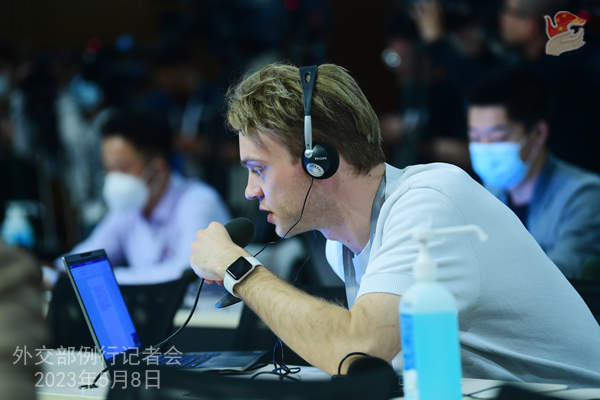
CRI: Following up on State Councilor and Foreign Minister Qin Gang’s visit to Norway, how do you see China’s relations with Norway at the moment? What does China hope to achieve through this visit?
Wang Wenbin: In recent years, the growth of China-Norway relations has sustained sound momentum. Guided by the important common understandings between leaders of the two countries, China and Norway have made impressive progress in trade, marine, green and winter sports cooperation and coordinated closely on climate change, biodiversity and multilateral affairs at the UN. All this speaks to the strong dynamism and potential of our relations.
Next year will mark the 70th anniversary of the establishment of diplomatic ties between China and Norway. We hope State Councilor Qin’s visit will be an opportunity for closer exchange, stronger mutual trust, more cooperation, and joint efforts to steadily advance bilateral relations and bring them to a new height in the new era.
AFP: State Councilor and Foreign Minister Qin Gang said in a meeting with US Ambassador Nicholas Burns this morning that a series of erroneous words and actions by the US side have undercut the hard-won positive momentum in bilateral relations. Could you elaborate on what specific words and actions he was referring to?
Wang Wenbin: We have released a readout on State Councilor Qin Gang’s meeting with Ambassador Burns. You can find answers to your question in that readout. Let me go over that part for you.
State Councilor Qin Gang said that the US needs to form a correct perception of China, return to rationality, get the basis right for China-US relations just like putting the first button on a shirt right, and succeed together. The US cannot talk about the need for communication on the one hand and yet keep suppressing and containing China on the other. The US cannot say one thing but do the opposite and needs to respect China’s red lines. The US needs to stop undermining China’s sovereignty, security and development interests, correctly handle the Taiwan question in particular, stop hollowing out the one-China principle, and stop supporting or conniving at the “Taiwan independence” separatist forces. The US needs to handle unexpected and isolated incidents in bilateral relations in a calm, professional and pragmatic manner to avoid dealing more blows to China-US relations. The US needs to seek dialogue and cooperation on the basis of mutual respect, mutual benefit and reciprocity. We hope that Ambassador Burns will be able to see, listen, interact and think more here in China, and serve as a bridge between China and the US.
Global Times: On May 7, the Arab League convened a special foreign ministers’ meeting, which agreed to readmit Syria to the group. As I understand, China has been supporting Syria’s return to the Arab League and has played a constructive part in this regard. What’s China’s comment?
Wang Wenbin: China welcomes and congratulates Syria on its return to the Arab League. We believe this is conducive to the strength and unity of Arab states, the development and revitalization of the Arab world and peace and stability in the Middle East. This serves the long-term interests of Arab states.
China has always supported Arab states in seeking strength through unity, and actively supported Syria in returning to the Arab League. China has actively engaged various parties through our own channels. Last month, Special Envoy of the Chinese Government on the Middle East Issue Zhai Jun visited Syria and had an in-depth exchange of views with Syria on seeking a political settlement of the Syrian issue and facilitating Syria’s return to the Arab League. Recently, China sent a task force to relevant Arab states for deep-going discussions on Syria’s return to the Arab League. At the invitation of State Councilor and Foreign Minister Qin Gang, Syrian Foreign Minister Faisal Mekdad will soon visit China. As a sincere friend of Syria and other Arab states, China welcomes and supports Arab solidarity and will continue to work relentlessly to that end.
Yonhap News Agency: Chinese experts have said through some Chinese media that if the ROK and Japan do not correct their wrong positions on the Taiwan question, it will be difficult to resume the ROK-China-Japan summit. What is China’s comment on this? Has China’s position on the resumption of the summit changed?
Wang Wenbin: China’s position on the Taiwan question is consistent and clear. We hope all parties will abide by the one-China principle. As close neighbors, China, Japan and the ROK have every reason to work together to maintain the political foundation of bilateral relations and stay committed to the steady, sound and sustainable growth of trilateral cooperation.
CCTV: On May 5, the WHO announced that COVID-19 no longer constitutes “a public health emergency of international concern”. What’s China’s comment?
Wang Wenbin: COVID-19 is humanity’s common enemy. The WHO announcement that COVID-19 no longer constitutes “a public health emergency of international concern” marks a significant outcome of the world’s joint response to the pandemic. It is an important victory.
In the battle against the coronavirus, the Party and the government of China have always placed the people and their lives above all else, followed a science-based and targeted approach and kept refining COVID response measures in light of the evolving situation. China has not only protected its own people’s lives to the greatest extent possible, but also served as a major source of COVID response supplies for the world, making China an important participant in international cooperation against the virus. We were among the first to commit to making COVID vaccines a global public good, support waiving intellectual property rights on vaccine research and development, start joint vaccine production with other developing countries, send medical experts teams abroad and conduct global origins-tracing cooperation with the WHO. With firm commitments and real actions, China has helped keep the international COVID response in the right direction and vigorously promoted the building of a global community of health for all.
China will continue to work with the international community, including the WHO, to contribute to global public health governance, protection for people’s life and health and efforts to build a global community of health for all.
Xinhua News Agency: We have noted that China announced earlier today that the presidents of Kazakhstan, Kyrgyzstan, Tajikistan and Uzbekistan will visit China. Can you share with us the program of the visits and China’s expectations? How does China view its relations with the five Central Asian countries?
Wang Wenbin: At President Xi Jinping’s invitation, the presidents of Kazakhstan, Kyrgyzstan, Tajikistan and Uzbekistan will pay state visits to China. President Xi Jinping will have meetings with the four presidents respectively. China is working with all sides to make thoughtful preparations for the visits and make them a full success.
China and Central Asian countries are friendly neighbors and comprehensive strategic partners. The two sides have been growing their relations following the principles of mutual respect, good-neighborly friendship, solidarity in trying times and win-win cooperation. We have deepened political mutual trust, upgraded practical cooperation and increased the depth and substance of our international coordination. We have truly become good neighbors, good friends, good partners and good brothers. China is ready to work with Central Asian countries to take the visits as a good opportunity to further expand all-round cooperation, elevate bilateral relations and contribute to peace, stability, development and prosperity in the region and the wider world.
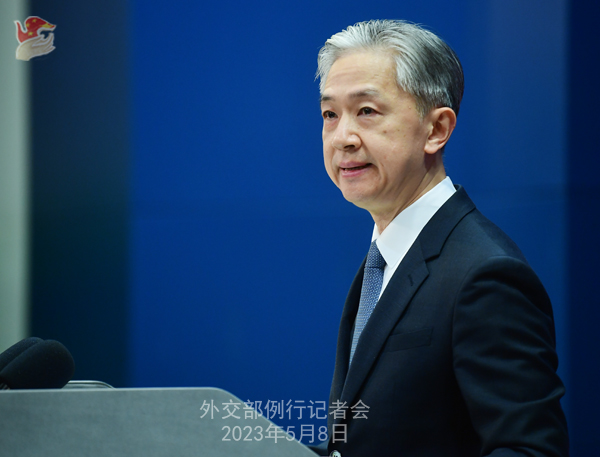
NHK: At the summit talks yesterday, Japanese and ROK leaders confirmed they will strengthen security cooperation between Japan and the ROK and with the US respectively regarding the DPRK’s nuclear and missile issues. And the two sides reached an agreement on the treated water from Fukushima Daiichi nuclear power plant, according to which the ROK will send a group of experts to the site later this month. Do you have any comment?
Wang Wenbin: My colleague stated China’s position on the Washington Declaration recently. The potential that other parties may join the Washington Declaration and participate in relevant cooperation will only escalate tensions in the region, undermine the nuclear non-proliferation regime and harm other countries’ strategic interest. We hope countries concerned will refrain from moving further down the wrong path.
The root cause and history of the issues on the Korean Peninsula are clear. Forming exclusive circles will not lead anywhere. Parties need to strive for a political settlement, address each other’s legitimate concerns in a balanced way and uphold the peace and stability of the Korean Peninsula.
On Japan’s disposal of its nuclear-contaminated water, we would like to stress that it matters to the health of the global marine environment and humanity at large. It is not Japan’s domestic matter. Japan’s neighbors and the rest of the stakeholders must be fully consulted before any decision is made. Over the past two years, China, the ROK, the Pacific island countries and people in Japan have voiced strong concerns and opposition to the wrong decision Japan has announced to discharge the nuclear-contaminated water into the sea.
Regrettably, however, Japan has been stubbornly pushing for its plan without fully communicating and consulting with the stakeholders — an obligation that Japan must fulfill — and has sought to impose its unilateral decision on its neighbors and the rest of the world. In April 2021, Japan unilaterally announced the decision. In July 2022, Japan approved the plan of execution. Recently, Japan has kept stating publicly that it will start the discharge process this year and will not postpone it. Meanwhile, Japan keeps claiming that the discharge plan is safe, without giving adequate scientific and factual evidence. And Japan still has not addressed international concerns over the legitimacy of the discharge plan, the reliability of the data about the nuclear-contaminated water, the effectiveness of the equipment to purify the nuclear-contaminated water and the uncertainties in the environmental impact.
If Japan truly wants to alleviate the concerns of the stakeholders, it needs to engage in communication without prejudging the result of its discharge, stop pushing through the discharge plan, set no unilateral timeframe for the discharge, effectively resolve all parties’ concerns, and agree to discussing all options other than discharging the nuclear-contaminated water into the ocean. Otherwise, none of the bilateral communication or field trip will be meaningful. They will only serve as Japan’s cover for executing its discharge plan.
Reuters: UK investment minister Dominic Johnson is currently visiting Hong Kong for meetings about fin-tech and financial services trade. Can the Chinese side share any information about the meetings? Was Hong Kong’s human rights record discussed in the meetings?
Wang Wenbin: I am not aware of what you mentioned. The human rights of Hong Kong citizens are effectively protected in accordance with law. No foreign country has the right to interfere in Hong Kong affairs.
AFP: Tomorrow marks the 1,000th day of the detention of Australian journalist Cheng Lei. Can the foreign ministry update us on the latest developments of the case?
Wang Wenbin: We have provided information several times about Cheng Lei’s being suspected of criminal offenses and handled by relevant Chinese authorities in accordance with the law. I would like to stress that the lawful rights and interests of the person concerned are protected.
Xinhua News Agency: May 7 marked the 24th anniversary of the bombing of the Chinese Embassy in the Federal Republic of Yugoslavia by US-led NATO. Do you have any comment?
Wang Wenbin: On May 7, 1999, the US-led NATO bombed the Chinese Embassy in the Federal Republic of Yugoslavia, killing three Chinese journalists and wounding more than 20 Chinese diplomats. The Chinese people will never forget what they sacrificed to uphold truth, fairness and justice. Nor will we ever forget this barbaric atrocity committed by US-led NATO.
While claiming to be a regional defensive alliance, NATO has been hyping up regional tensions and creating bloc confrontation. After the Cold War, from Bosnia and Herzegovina to Kosovo, from Iraq to Afghanistan, and from Libya to Syria, US-led NATO has repeatedly lit the fuse and brought conflicts to places all over the world. Available data shows that in the years after 2001, NATO has launched and participated in wars that have killed hundreds of thousands and displaced tens of millions of people. Over the recent years, NATO has been making forays eastward into the Asia-Pacific, instigating bloc confrontation and undermining peace and stability in the region. This has put regional countries on high alert.
At the site of the bombed Chinese Embassy in the Federal Republic of Yugoslavia stands a monument engraved with “Remember our Martyrs and Cherish Peace”. The US-led NATO needs to seriously reflect on the crimes they’ve committed, abandon the outdated Cold War mentality, stop inciting tensions in the region, and stop sowing division and instability.
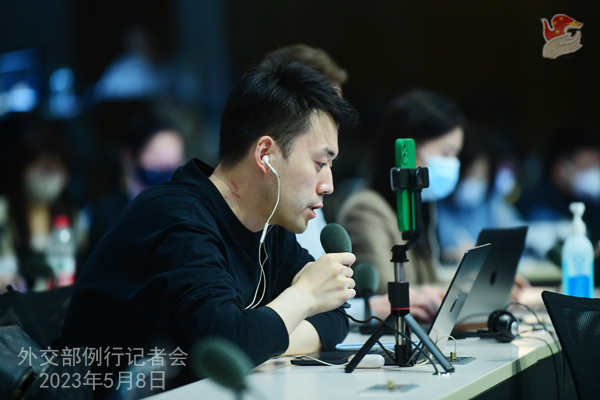
China Daily: From April 24 to May 5, the International Independent Expert Mechanism to Advance Racial Justice and Equality in the Context of Law Enforcement of the UN Human Rights Council paid a visit to the US. At a press conference after the visit ended, they called on the US to boost efforts to promote accountability for actions of racism and racial discrimination and take measures to address the socioeconomic woes faced by people of African descent. Do you have any comment on this?
Wang Wenbin: We noted the recent visit to the US by the International Independent Expert Mechanism to Advance Racial Justice and Equality in the Context of Law Enforcement of the Human Rights Council. According to reports, during the press conference at the end of the visit, the independent expert mechanism noted that, “Slavery has left a deep and long-lasting entrenched legacy on the country, which can be perceived through generational trauma. Racial discrimination permeates all contacts with law enforcement...by means of...arrest, detention, sentencing... In each of those aspects, available data points to a clear disproportional impact upon people of African descent.” They called on the US government to take more robust action to result in strong accountability measures for human rights violations, boost oversight mechanisms concerning law enforcement officials and provide holistic reparation and support to victims of racial discrimination.
After George Floyd, an African American, died from the knee-on-neck hold by the police in 2020, the UN Human Rights Council held an urgent debate to call for greater attention on the racial discrimination in US law enforcement. This above-mentioned international independent expert mechanism was established in 2021 by the Human Rights Council to advance racial justice and equality and ensure access to accountability. Regrettably, even till today, there have been frequent incidents of police racial violence and rising discrimination against people of African descents and other minorities. The US police’s violent law enforcement and racial discrimination fully exposes the country’s callousness for the right to life and the US society’s deep-seated racial woes. The US is not a model country on human rights, but a poor example with a long record of human rights abuses and violations.
We call on the US to earnestly respond to the concerns of the international community, deeply reflect upon its serious problems of racism, racial discrimination and police violence, and stop meddling in other countries’ internal affairs under the pretext of human rights. The US needs to take concrete steps to address its grave problems of racial discrimination, let truth and justice prevail for the victims and prevent the tragedy of George Floyd and tens of thousands of victims of racism like him from happening again.
Bloomberg: I’m just following up on Foreign Minister Qin Gang and US Ambassador Nicholas Burns’ meeting. And we’re wondering do you have any information on why they met now and if this signals any willingness on the Chinese side for higher-level exchanges?
Wang Wenbin: This is a normal diplomatic arrangement.
Reuters: On Friday, South Korea’s embassy in China published a letter criticizing the reporting of The Global Times, describing the paper’s recent articles on the administration of South Korea as slanderous and provocative. The Global Times criticized this letter in an editorial this morning. What does the dispute tell us about China-South Korea relations? And what is China’s comment?
Wang Wenbin: We have noted relevant reports as well as the response by The Global Times. While the recent unfavorable rhetoric between China and the ROK did not have to appear, it is pretty clear what caused it in the first place. The relevant views do not represent those of the Chinese government. They do reflect though how Chinese people look at this. The key to avoiding negative press is to manage its source. We hope the ROK side will make a constructive effort to that end.
Bloomberg: A question on a report from The Wall Street Journal. The journal reported that Beijing curtailed access by overseas firms to Chinese data sources in part because of a series of reports written by US research institutions. Does the foreign ministry have any comment and could you confirm this?
Wang Wenbin: I am not aware of what you mentioned.
